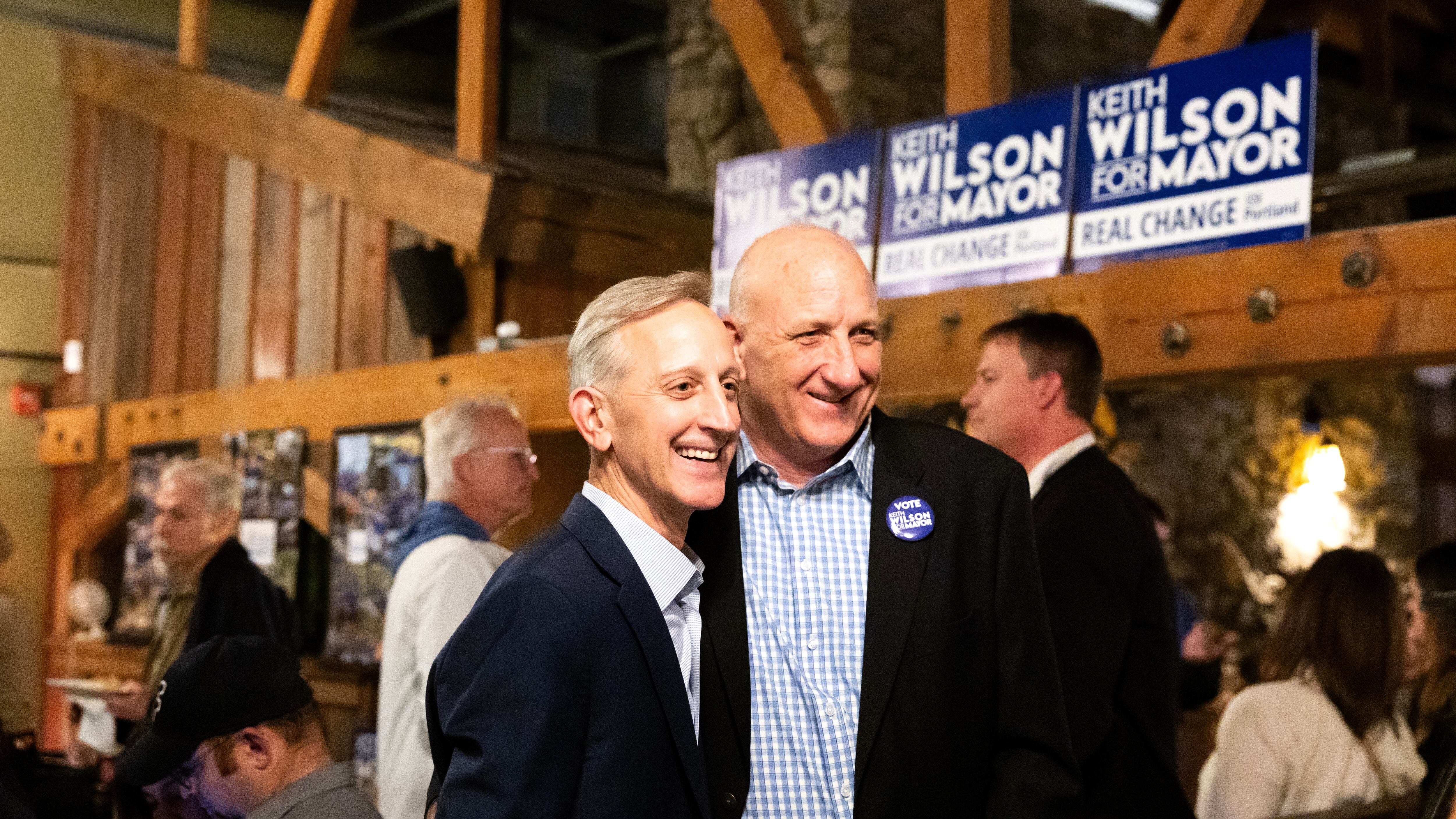The next mayor of Portland, Keith Wilson, spoke to a crowd of press and onlookers at the Charles Jordan Community Center in North Portland on Thursday afternoon after results showed voters chose him by a landslide.
Wilson, ever bright-eyed and positive, said he would do everything in his power to create a safer, cleaner and more economically prosperous Portland.
“Voters aren’t interested in politicians pointing fingers, they just want us to get things done,” Wilson said to a crowd of 200 sitting in folding chairs and standing along the walls of the old gymnasium. “It’s time to end unsheltered homelessness and open drug use and restore public safety in Portland.”
Wilson said he would approach the job with “humility.”
“There’s a big job ahead of all of us,” Wilson said. “I’m up for the challenge.”
Three months ago, Wilson, owner of trucking company Titan Freight, was seen as a distant third contender in the race for mayor, flailing to keep up with the name recognition of sitting City Commissioners Carmen Rubio and Rene Gonzalez, who also ran for mayor. But as voters increasingly learned of Rubio’s and Gonzalez’s flaws, Wilson gained steam, picking up Willamette Week’s editorial endorsement and generating endorsements from a handful of labor unions.
By Wednesday evening, even though more than 100,000 ranked-choice ballots remained to be counted, results showed that Wilson had taken the race by a landslide. He garnered 35% of first place votes in the first round of counting, compared to 21% collected by Rubio and 19% collected by Gonzalez. Redistribution of other rankings on the ranked-choice ballots had little impact on his margin of victory.
Rubio and Gonzalez conceded the race to Wilson on Wednesday evening, both writing that they had called Wilson to congratulate him on his win. Rubio wrote that serving on the City Council had been the “privilege of a lifetime,” and Gonzalez declared it was time for Portlanders to “rally behind [Wilson] as we work to make Portland all that we want it to be.” (Rubio and Gonzalez will end their terms on the City Council at the close of the year as a new, 12-member council takes office at the beginning of 2025.)
At the gym, Wilson apologized for the “bare-bones” setup. In attendance were U.S. Reps. Earl Blumenauer and Suzanne Bonamici, Portland City Commissioner Dan Ryan, and a handful of the top City Council candidates. “We are absolutely and completely broke,” Wilson joked, to laughs from the crowd. “We ran this campaign like there was no tomorrow.”
Wilson says he’s already spoken to Gov. Tina Kotek, Mayor Ted Wheeler, Multnomah County Chair Jessica Vega Pederson, and Metro President Lynn Peterson.
Wilson’s remarks were brief and joyous. The crowd gave him a standing ovation at the end.
Wilson’s campaign was almost entirely focused on an ambitious plan to end unsheltered homelessness within one year of taking office by setting up low-cost nighttime shelters every single night. By Wilson’s calculations, once the city ends unsheltered homelessness, it will save $300 million annually and can divert those dollars to beefing up basic services like safer roads and additional police officers, and supporting small businesses.
In an Aug. 21 profile of Wilson, WW wrote that veteran politicos regarded Wilson’s homeless shelter plan as unserious.
“We have communicated directly to Keith that while we appreciate his urgency, we are deeply concerned that his promise to end unsheltered homelessness in a single year falls into the same pattern of so many failed plans of the past,” Jon Isaacs, executive vice president of public affairs for the Portland Metro Chamber, said at the time.
But Wilson rebutted that characterization. “Why is keeping the failed status quo,” he asked WW, “considered ‘more serious’ than learning from what works?”
When Wilson takes office, he’ll oversee a city administrator that handles all city bureaus and functions, while the 12-member City Council will set policy for the city. Wilson will not have veto power on the council, but he will cast the deciding vote in the event of a tie.
